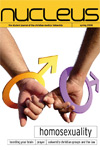The scientist sits in his laboratory, peering down his microscope at the myriad samples of cells. Still and lifeless, they nonetheless demonstrate the magnificent array of tissue types that form the human body. From the humble erythrocyte to the astonishing nerve cell. Each part is individually powerless and yet collectively indispensable to the human body.
The authors reflect upon the remarkable diversity within the human body. It is similar to another body, comprising millions of startlingly different individuals; the body of Christ. From the outside, the Church must appear a rather motley collection of people. What could possibly connect a high church Anglican to a Pentecostal, the Queen to Jason Robinson, Bono to Mother Teresa? The answer, of course, is the life giving Spirit of the living God and trust in the blood of the risen Christ.
God uses all sorts to achieve his purposes: Moses – the wanted murderer; David – the adulterer; Paul – the instigator of religious persecution. Yet he was able to perform mighty acts through them. It is our weaknesses, rather than our strengths, that make us suitable for God's service. As the Lord replied to Paul, 'my power is made perfect in weakness' (2 Cor 12:9).
The authors implore us to embrace this diversity and to see the worldwide Church as God does. His children – with their different cultures, gifts and failings – are bound together by the love of God and empowered to carry his gospel to the four corners of the world. They see this diversity as the very 'basis for our unity' in Christ, and they urge us to abandon prejudice against believers who do things differently from us, instead looking at the heart of their worship and their desire to live for God. They declare that '[God], understanding the cultural background and true intent of the worshippers, likes the variety he sees'.
Personally, I was forced to reconsider my view of the church. There is a great temptation to view our own way as 'right' or 'biblical' and to be judgmental about those who do things differently. Here is a challenge to see variety as something created by God, and pleasing to him. This message should inspire us, as Christian medics, to embrace the varied talents and attributes in each other. It should encourage us to be humble and willing to listen, valuing and supporting our fellow brothers and sisters in Christ. That way, we may learn to work together to advance God's kingdom on earth.
































